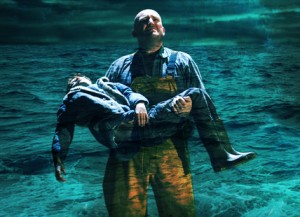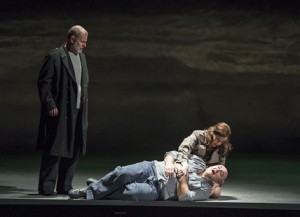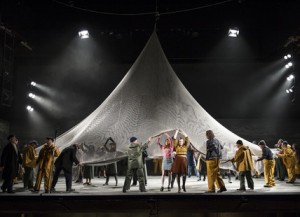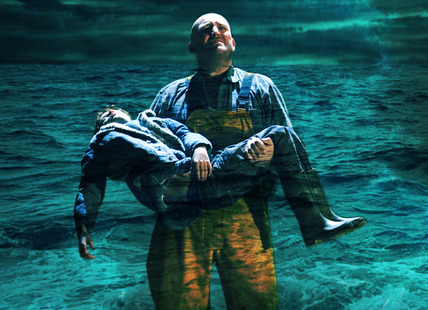
Over the course of this Britten centenary year, two themes have sung out to me again and again, from everything I’ve watched, read or participated in. One is Britten’s mastery with English texts; his knack for choosing imaginative, well-crafted words to set, and then his exquisite skill in setting them to music. The second theme is the importance that Britten placed on making music available to everyone, particularly young people. Unfortunately, Opera North’s decision to present Peter Grimes without surtitles trampled over both of these ideas.
This was a pity, because otherwise, Phyllida Lloyd’s production was excellent, and the singing was faultless, but the performance was diminished for me by the fact that I could only get about a third of the text. I knew the story well enough, and could get enough to follow roughly what was going on, but the nuances and the psychological insight into Peter and Ellen’s characters completely passed me by. I found an online libretto on my phone during the intervals, and realised just how much I had missed, swathes of strange but lovely imagery, and the sense that there is more to Peter than violence and isolation. The wonderful music helps, of course, but when you’re straining to hear the words, it’s harder to concentrate on the music. The skimpy synopsis in the programme didn’t help, as it only really followed the story of Peter and Ellen, and mostly omitted the townspeople scenes. As these big ensembles were the hardest for following text, I was clueless as to what was happening. I felt as if I was being excluded from a special club of Britten initiates who knew the opera well enough to follow it (and remember, when you yourself know a text well, you delude yourself into thinking that every word is in fact crisply audible) – how would a newcomer have felt?
In fairness to Opera North, I assume that perhaps there were copyright problems or expenses that meant they couldn’t use surtitles and that the feeble explanation on their website (buried in a blog post) was an attempt to gloss over this. After all, if you’re set on presenting Grimes “as the composer intended” why were titles provided for Death in Venice in the same production run?
I make no apologies for taking up several paragraphs on this – it’s important, and I know from reading online comments, and from chatting to people afterwards that I’m not alone in this. A complete stranger who overheard me talking to someone I knew on the way out came up to me and said she was so glad to hear someone else saying what she thought – and unlike me, she hadn’t been sitting in the cheap seats. We have the technology available that gives everyone who wants it the opportunity to get more out of a performance, at whatever level they need. If there is a good reason that it can’t be used, at least be frank about it.
The rest of the review…
It’s a pity about the titles, because the production was otherwise excellent, and I should have enjoyed it much more than I did. I also want to make it quite clear that the singers were not in anyway at fault – the diction was probably as clear as it can ever be and they all projected well, so that the sound was clearly audible and well-balanced with the orchestra, even right up in the amphitheatre seats.
Phyllida Lloyd’s 1970s setting emphasised the grim introversion of the Borough community, as this was perhaps the last decade in which that way of life really existed. The set was minimal – apart from the rickety of Peter’s hut, that wobbled fearsomely as Jeffrey
Lloyd-Roberts swung his bulk around it – the only props were wooden pallets that became wharfs, floorboards, boardwalks or barriers, and a vast net that engulfed the entire community. It was drab, bleak and very effective.

Lloyd-Roberts has a fantastically strong voice and he does a good line in brooding, haunted madmen; I’ve admired his performances with Opera North in From the House of the Dead and Queen of Spades and as Grimes he was near-perfect. He put across Grime’s pent-up anger with an awkward gait and heavy movements, and his great visionary moments had a childlike innocence about them, as if he himself couldn’t understand how he, with all his awkwardness and anger could transcend the ugliness and brutality of his world. In Peter’s final scene, when he finally cracks under the pressure and is being hunted by the crowd, the orchestra stops, leaving Grimes devastatingly alone, delivering a long unhinged monologue. It’s long and both emotionally and technically demanding and Lloyd-Roberts’s performance was gripping. Britten’s final stroke of genius in this searing scene is to have the final words spoken instead of sung, giving uncompromising force to Peter’s final moments.
Giselle Allen as Ellen Orford was a lovely counterpart to Lloyd-Roberts. Her warmth and unfailing affection was a poignant balance to his rage; her carefully controlled vibrato added depth and wisdom to Ellen’s character and her acting exuding gentle solicitude for

everyone she encounters. I did take exception to Ellen and Peter’s passionate kiss at the end of their first conversation though, as I’ve always understood their relationship to have been thwarted partly by their own inability to express their true feelings directly to each other. The supporting roles were well cast too. Robert Hayward matched Giselle Allen very well as the kindly Bulstrode, both singers strongly conveying their mutual support for each other in their desire to help Peter, despite their differences over how best to do that. Jennifer France and Aoife O’Sullivan were wonderfully comic as the slutty nieces and at the other end of the moral scale, I loved Rebecca de Pont Davies as the prim, disapproving busybody Mrs Sedley. The Chorus of Opera North made a thrilling sound in their rages, tight, disciplined, and full-bodied.
During the orchestral interludes, the cast filled in gaps or acted out characters’ thoughts and I thought these were a bit heavy handed. Peter’s naked body was pulled out of the sea before we’d heard a single note, and the Borough crowd violently attacked an effigy of Peter before they began hunting him. During the Passacaglia interlude, the cast constructed the set for Peter’s hut and it became Peter’s sad vision of a happy future, as he and Ellen,
with two children, stood watching the community building their house. (Just in case we couldn’t follow the words of Peter’s own musings later in the scene?). The orchestral playing though was magnificent. The first interlude, Dawn shimmered and sparked; Aldeburgh beach appeared vividly in my mind. The opening of the Passacaglia interlude with its haunting viola solo was beautifully played and a special mention must go to the off-stage tuba player who provides the only instrumental part of Peter’s last scene, punctuating Peter’s ravings with the melancholy sound of a distant fog-horn – this was quiet, focussed and controlled.
The final shock of Grimes is the epilogue, when we see the folk of the Borough calmly going about their daily business, chatting idly about the coastguard sighting a sinking boat; the waters close over Grimes and he sinks immediately out of their memory. Their indifference only helps to etch the tragedy of Peter Grimes even more firmly into our own memories.








